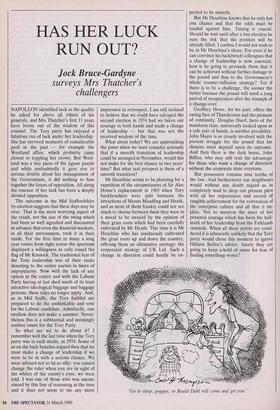HAS HER LUCK RUN OUT?
Jock Bruce-Gardyne surveys Mrs Thatcher's challengers
NAPOLEON identified luck as the quality he asked for above all others of his generals, and Mrs Thatcher's first 11 years have borne out of the wisdom of this counsel. The Tory party has enjoyed a fabulous run of luck under her leadership. She has survived moments of considerable peril in the past — for example the Westland affair, which probably came closest to toppling her crown. But West- land was a tiny piece of the jigsaw puzzle and while undoubtedly it gave rise to serious doubts about her management of the Government, it did nothing to fuse together the forces of opposition. All along the essence of her luck has been a deeply divided opposition.
The outcome in the Mid Staffordshire by-election suggests that these days may be over. That is the most worrying aspect of the result, not the size of the swing which had been so well signalled and discounted in advance that even the financial markets, in all their nervousness, took it in their stride. For the first time in many a long year voters from right across the spectrum displayed a willingness to rally round the flag of Mr Kinnock. The traditional fear of the Tory leadership was of their ranks deserting to the centre parties in times of unpopularity. Now with the lack of any option in the centre and with the Labour Party having at last shed much of its least attractive ideological baggage and baggage persons, these rules no longer apply. And, as in Mid Staffs, the Tory faithful are prepared to do the unthinkable and vote for the Labour candidate. Admittedly, one swallow does not make a summer. Never- theless this is a substantial and seemingly sombre omen for the Tory Party.
So what are we to do about it? I remember well the last time when the Tory party was in such straits, in 1974. Some of us on the back benches argued then that we must make a change of leadership if we were to be in with a serious chance. We were advised not to be so silly: you cannot change the rider when you are in sight of the whites of the enemy's eyes, we were told. I was one of those who was uncon- vinced by this line of reasoning at the time and it does not seem to me any more impressive in retrospect. I am still inclined to believe that we could have salvaged the second election in 1974 had we taken our courage in both hands and made a change of leadership — but that was not the received wisdom of the time.
What about today? We are approaching the point when we must consider seriously that if a smooth transition of leadership could be arranged in November, would this not make for the best chance in two years' time? But what real prospect is there of a smooth transition?
Mr Heseltine seems to be planning for a repetition of the circumstances of Sir Alec Home's replacement in 1965 when Tory backbenchers were split between the attractions of Messrs Maudling and Heath, and as most of them frankly could not see much to choose between them they were in a mood to be swayed by the opinion of their grass roots which had been carefully cultivated by Mr Heath. This time it is Mr Heseltine who has assiduously cultivated the grass roots up and down the country, offering them an alternative strategy: the corporatist strategy of UK Ltd. Such a change in direction could hardly be ex- pected to be smooth.
But Mr Heseltine knows that he only has one chance and that the odds must be loaded against him. Timing is crucial. Should he wait until after a lost election he runs the risk that the position will be already filled. I confess I would not wish to be in Mr Heseltine's shoes. For even if he can convince his backbench colleagues that a change of leadership is now essential, how is he going to persuade them that it can be achieved without further damage to the pound and thus to the Government's whole counter-inflation strategy? Yet if there is to be a challenge, the sooner the better because the pound will need a long period of recuperation after the triumph of a change-over.
Geoffrey Howe, for his part, offers the caring face of Thatcherism and the promise of continuity. Douglas Hurd, hero of the mandarin class, universally looked upon as a safe pair of hands, is another possibility. John Major is so closely involved with the present struggle for the pound that his chances must depend upon its outcome. And then there is the dark horse, John Biffen, who may still trail the advantage for those who want a change of direction without the corporate state overtone.
But possession remains nine tenths of the law. And furthermore our neighbours would without any doubt regard us as completely mad to drop our present pilot with all her experiences and record of tangible achievement for the restoration of the enterprise culture and all that it im- plies. Not to mention the asset of her personal courage which has been the hall- mark of her leadership from the Falklands onwards. When all these points are consi- dered it is inherently unlikely that the Tory party would chose this moment to ignore Ilillaire Belloc's advice. Surely they are going to keep a-hold of nurse for fear of finding something worse?
Go to sleep, poppet, or Road Dahl will come and get you.'


























































 Previous page
Previous page